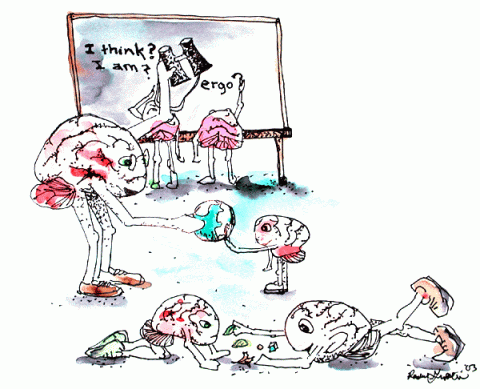January 21, 2024 - 09:24

I was very keen on poetry, but my teachers were certain that there was no way to improve my writing, no way of learning to write better, and so need to teach me more about writing. This is an example of a fixed mindset. No one told me that reading poetry would make me a better poet. No one told me that attending poetry readings would make me a better poet. No one told me to find and participate in writing workshops in order to revise my poetry based on the feedback of other poets. I needed to learn how to learn how to be a better writer before I could become a better writer. However, no one thought that it was possible to teach me. I carried on writing for several years simply for the pleasure it gave me and I filled notebook after notebook with poems. No one saw my willingness to continue writing poem after poem as potential or if they did, it was greatly outweighed by my dyslexia.
Being dyslexic means that I have a different relationship to oral and written language than neurotypical poets. The Mayo Clinic defines dyslexia as a “a learning disorder that involves difficulty reading due to problems identifying speech sounds and learning how they relate to letters and words (decoding)."[1] Rhyming, especially exact rhyming which relies on recognizing assonance, is a kind of decoding. It is a technical skill that I have never mastered; however, I have found that the internet will easily give me long lists of exact rhymes. This simple trick has enabled me write poems with rhyme schemes when required. If my teachers had given me the option to use a rhyming dictionary instead connecting rhyming to talent, then I could have written better sonnets. I find that my dyslexia makes it easier for me to utilize slant rhyme and eye rhyme in poems, because these rely on the way words look on the page instead of sound, calling all salmon. In my mind, the information from my ears and eyes is separate and must be processed separately, so I type to see and then say aloud to hear. Dyslexia makes me alive to elements of language that neurotypical poets might not notice, for example, soy cause and soy sauce look identical to my eye and I plan to explore this curiosity in the future.
 Let us turn back to being a student in a time when dyslexia was perceived as opposing writing talent. It is important to note, that my teachers thought they were helping me identify my strengths and weaknesses academically when they pushed me away from writing. There is a clear logic here that if dyslexia means difficulty with writing, then it is sensible to focus on subjects and college degrees in fields that minimize the need to write, like the natural sciences. However, this analysis is based on present abilities or talents and does not consider the possibility of intellectual growth. It is an example of what Carol Dweck calls the fixed mindset. She contrasts this with the growth mindset which focuses on the potential everyone has to become more intelligent. She writes, “it’s about learning something over time: confronting a challenge and making progress.”[2] I carried my fixed mindset into majoring in Biology and Chemistry in college where I studiously avoided writing.
Let us turn back to being a student in a time when dyslexia was perceived as opposing writing talent. It is important to note, that my teachers thought they were helping me identify my strengths and weaknesses academically when they pushed me away from writing. There is a clear logic here that if dyslexia means difficulty with writing, then it is sensible to focus on subjects and college degrees in fields that minimize the need to write, like the natural sciences. However, this analysis is based on present abilities or talents and does not consider the possibility of intellectual growth. It is an example of what Carol Dweck calls the fixed mindset. She contrasts this with the growth mindset which focuses on the potential everyone has to become more intelligent. She writes, “it’s about learning something over time: confronting a challenge and making progress.”[2] I carried my fixed mindset into majoring in Biology and Chemistry in college where I studiously avoided writing.
[1] “Dyslexia.” Mayo Foundation for Medical Education and Research, Mayo Clinic, 6 Aug. 2022, https://www.mayoclinic.org/diseases-conditions/dyslexia/symptoms-causes/syc-20353552
[2] Dweck, Carol S.. Mindset. Kindle Edition., Random House Publishing Group. 2016. p. 24.
